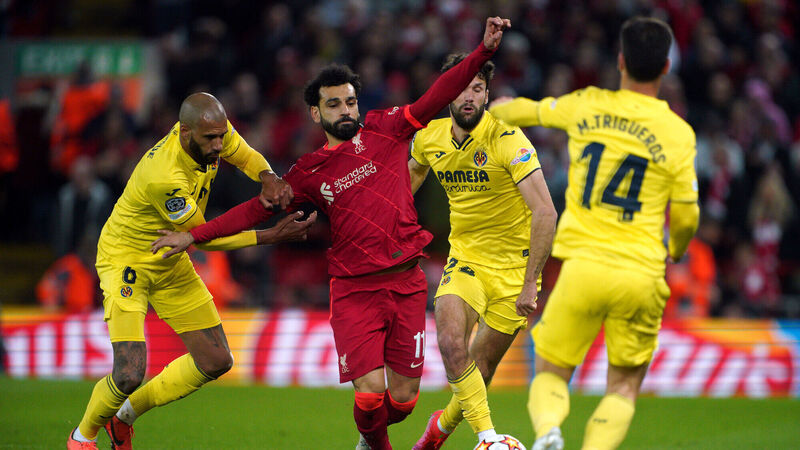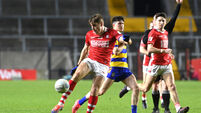Premier League: TV schedule putting titles and players' health at risk

Liverpool's Mohamed Salah battles for the ball with Villarreal’s Etienne Capoue (left) and Alfonso Pedraza during the UEFA Champions League semi-final, against Villarreal at Anfield, Liverpool. Picture: Peter Byrne/PA Wire
TWO weekends ago, Liverpool were facing into 11 fixtures, requiring victory in all if they were to complete an unlikely and unprecedented quadruple of titles. Four matches on and four wins later, and somehow the task for Jurgen Klopp and his team seems even harder to complete.
The most recent run of fixtures were seen as the big obstacle ahead for Liverpool's multiple trophy hopes. Man City in the FA Cup semi-final, perennial arch-rivals Man United and the Merseyside derby with Everton in the Premier League, followed by the notoriously difficult Villarreal in the Champions League semi-final, all looked like credible banana skins for the Reds to slip on. Instead, this considerable assignment was completed with relative ease, with 11 goals scored for just two conceded across the four matches

.
Yet, with seven and possibly eight games remaining, the title mountains look even more impossible to climb.
Sure, Liverpool are secure in the FA Cup final, and they have a toe in the Champions League final too, yet the idea of completing the title tasks seems impossible while still facing the considerable chore of completing five Premier League matches on a schedule almost designed to see them fail.
Klopp had requested a delay of the kick-off to the evening at 7.45 pm, at least, at St James' Park from the Premier League so that his team, would at least get 72 hours recovery between the matches.

But the Premier League and the TV channel covering the game, BT Sports, felt that the advance of a team from their league in Europe's top event is secondary to the TV money a Saturday morning-afternoon clash can reap for the two organisations.
How often have we seen sides struggle in the weekend game after European midweek ties? The ability to boost your morale and performance after the emotional and energy-sapping efforts of European competition is well recorded and has often cost returning sides domestic points in the league.
That Man City will play Leeds away at 5.30pm this evening, with a day extra to recover from their game at Real Madrid, and Liverpool face an early start on a day shorter to recover seems like a clear advantage to City at this crucial point of the season. It must also be noted that Liverpool will also have a day less recovery for their Champions League return leg.
To be fair, Pep Guardiola's side were made to work a lot harder for their second-leg advantage in that crazy see-saw semi-final at the Ethiad, compared to Liverpool, who had an almost placid encounter in their Anfield win.

Still, the lack of recovery time for professional athletes would appear to be more crucial than the extent of the energy expended in the actual match. Professional teams have built up quite the accurate science regarding recovery and downtime for their players, and the full three days recovery lag is pretty well respected among sporting organisations.
Now a 12.30 start is an enjoyable TV spectacle and it's understandable a station would not want to give up an enticing fixture with a title contender, but TV rights and viewing figures should never dictate or hinder the progress of a team's title challenge, or worse, put the health of players at risk by demanding a return to action when the player is not properly recovered. This early start could have a dramatic effect on the prospects and future of Liverpool and its players.
The ridiculous thing is that from next season, TV broadcasters have already agreed that the 12.30pm slot on a Saturday will not involve any teams in Champions League action on the Wednesday before, so at least common sense has prevailed and this problem will disappear next season. But that will be of little comfort if Klopp should lose the game to the Toon or have key players injured due to a mere lack of time to recover thanks to the intransigence of the governing body and a TV station.









 App?
App?







